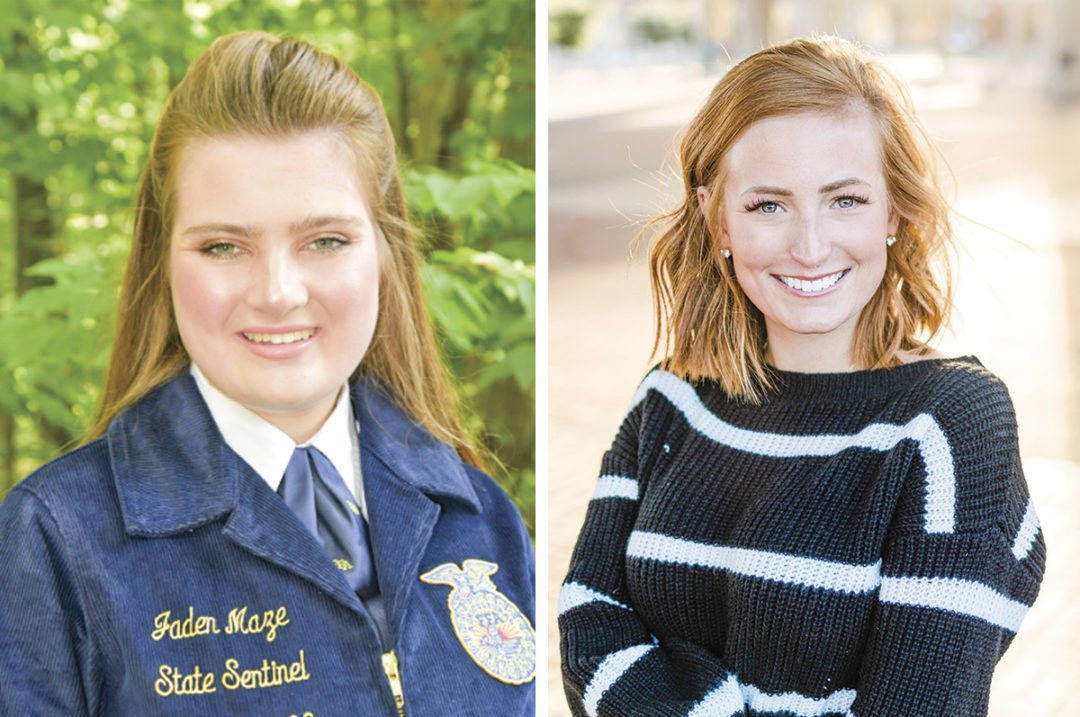Four ccs of Micotil was Maddie Caldwell’s answer to the suicidal thoughts that had taken over her life at age 22. It was her second attempt to die by suicide, and she went on have three seizures on the way to the hospital. Thankfully, she is healthy now and wants to help “get one person to feel a little less alone.”
Her intentions around suicide changed that day in one moment.
“Seeing my dad on his knees in the middle of the road as the ambulance door closed will forever be burned in my mind,” Caldwell says. “I knew I could never do that to him again.”
As a parent, I can’t even imagine how difficult this has been for her family, especially knowing that her dad takes calls to help others in a similar position. I have nothing but immense respect for Caldwell and her family. She very openly shared the toughest parts of her life with me, simply because she wants to help others facing a “broken brain.”
Even after succeeding in the show ring, winning the National FFA Proficiency in ag sales and flourishing in college, she knows how all-consuming anxiety and depression can be. She’s not always comfortable talking about her personal struggles, even now, but she wants to be open enough to encourage people in agriculture to get help.
She’s lived the difference in generational attitudes toward mental health, with grandparents who have a hard time talking about her anxiety, suicide attempts and subsequent medications. She tries to help them understand that something was wrong in her brain and emphasizes that mental health is health.
“My brain chemistry was off,” Caldwell explains. “If I broke my arm, what would happen?”
She goes on to describe the tests that would be run, x-rays and then a diagnosis. The same is true for her self-described “broken brain,” but no one can see that like a broken arm. It’s equally as important to get help in both scenarios but harder to figure out what’s going on in the brain.
When help is needed, she recommends starting the conversation with a doctor as a baseline who will likely refer you to a specialist, and in turn, a therapist. She found her perfect combination when she finally had a therapist and psychiatrist under the same roof so they could compare notes and get the right mix of counseling and medication. Caldwell warns that it can take years to happen, but to stay the course.
Case in point: Her doctor offered no alternative medications when she first visited. She thought she was unfixable, which led to her first suicide attempt a few months later. She likens trying to find the right medication to finding the right drink – some people like milk, others tea and yet others prefer soda or coffee. It’s a process to find what each brain likes; she’s now been on the same dose since May 2020 and is in a great place mentally.
“Find what best fits your needs,” Caldwell recommends.
She says she believes virtual therapy is a good fit for people in agriculture because of the flexibility and anonymity it offers. Caldwell went through different therapists before finding the perfect combination of counseling and medication, similar to finding the right physical therapy and medication after physical trauma.
When I asked her about signs to look for in young people, she said anytime a family member or friend stops participating in activities they once enjoyed, it’s time to get help. She talked about how important family meals were as she grew up, but she started secluding herself from that time, which was a huge sign, along with her huge change in appetite.
“My story felt so small, but now I realize differently,” she says.
Part of that perspective shift started when Jaden Maze, an FFA member in Indiana, interviewed Caldwell. Jaden’s resulting speech about mental health and agriculture went on to win Indiana’s prepared speaking contest and has since been heard by hundreds.
“As a young adult involved in agriculture myself, I understand Maddie’s hopelessness – similar to how many others in agriculture currently feel,” Maze says. “We have lost our vision for the future throughout the fluctuations of the last decade. Leading up to 2020, weather challenges and trade wars contributed to a decrease in net income for many farmers. Enter COVID-19: schools, restaurants and processing plants across the country closed, forcing farmers to dump milk down the drain, euthanize animals and leave produce to rot.”
In her moving speech, Maze highlighted an Ohio State University study that found that youth living in rural America face suicide rates double that of those who live in urban areas, and only 3% of rural communities in the country offer suicide prevention services specifically for youth. Couple that with the Centers for Disease Control reporting that agriculture is the leading occupation for suicide – along with our stubbornness in seeking help – and it is pretty clear why we have a crisis.
Maze called on agriculture to normalize conversations about mental health to create a new vision, citing the American Farm Bureau Federation’s survey that showed 87% of farmers have expressed that it is important to reduce the stigma of mental health in agriculture. Maze, like Caldwell, has experience with the differences in how generations approach stress and is now a state FFA officer working to change that.
In the close of her speech below that advanced through the rounds at the National FFA Convention to become one of the final four in the 2022 National Prepared Public Speaking contest, Maze calls on each of us to act:
“The solution to addressing these problems and creating a new vision for agriculture starts with you. Educate yourself, advocate to others, and take action.
-
"Educate. How can you learn about mental health? Research statistics, evaluate your own mental health and obtain the treatment that is best for you. Pay attention to the mental health struggles of others, especially your loved ones impacted by farm stress. Signs of stress include withdrawing socially, change in mood or routine, rapid weight gain or loss, increased use of drugs or alcohol and decline in the appearance of the farm. Proper nutrition, adequate sleep, exercise and talking to people you trust can go a long way in bettering one’s mental health.
-
"Advocate. How can you spread the word? Take opportunities to speak publicly, raise awareness on social media or support rural mental health legislation. Promote resources that are becoming more available, such as the Farm Crisis Center, Extension Farm Stress Teams and international organizations such as the Do More Ag Foundation in Canada.
- "Act. How can you help others? Bring the mental health discussion into your school and community. After a student died by suicide at my school, I helped start our first mental health club to provide better resources for students who are struggling; this has taught me the dire need of having difficult conversations. If someone you know shows signs of degrading mental health, be transparent with them. You will not plant the idea of suicide by asking them directly if they plan on harming themselves. That person will be grateful you cared enough to ask, and you will be, too.
"Making a difference starts with your choice to find hope through healing. Maddie wants you to know, it is OK to not be OK, but don’t stay there. Will you be a part of a new vision for the future? If each of us stand up for the mental well-being of agriculture, our rural communities can change to a new lens. I believe in the future of agriculture and that we all can exert an influence in our homes and communities. Do you?"
Maze and Caldwell are young people who are rising to the challenge to have different conversations about mental health. Will you join them?







